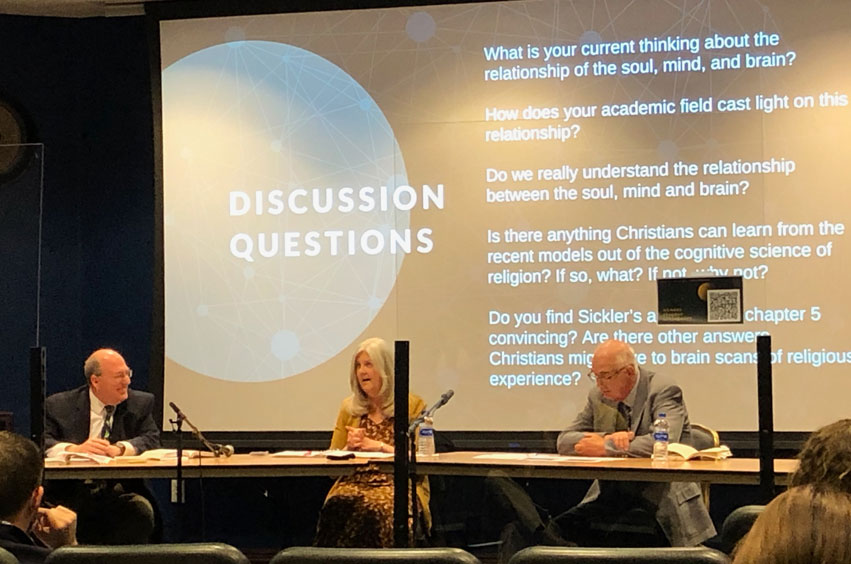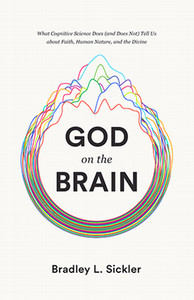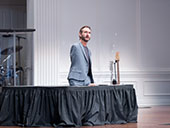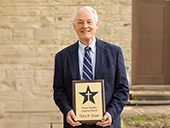God on the Brain: DBU Faculty Panel Discusses Intersection of Faith, Psychology, and Biology
This article is over six months old and may reference former titles for DBU faculty or staff, discontinued programs, or other details that have since changed. If you have any questions, please contact us at news@dbu.edu, or (214) 333-5172.

Brad Sickler’s 2020 release God on the Brain: What Cognitive Science Does (and Does Not) Tell Us about Faith, Human Nature, and the Divine (Crossway) was the subject of a faculty panel discussion at a recent Friday Symposium moderated by Dr. Philip Mitchell, Associate Professor of English and Director of DBU’s Honors program.

The interdisciplinary conversation was led by three DBU professors: Dr. Kenneth Gore, Professor of Biblical Studies; Dr. Joan Davis, Professor of Counseling and Psychology; and Dr. Curtis Lee, Professor of Biology. Together, these scholars explored the relevance between faith and contemporary neuroscience from their respective academic expertise in Biblical studies, psychology, and biology and discussed how these elements all work together to provide a cohesive worldview rooted in the Lordship of Christ.
Sickler’s new book, as it states on the back cover, “offers a timely theological, scientific, and philosophical analysis of cognitive science, arguing that the brain is more complex than what can be explained by science alone." Through God on the Brain, Sickler “guides readers to confidently affirm that the Christian worldview offers the most compelling vision of the true nature of humanity."
A key element of Sickler’s writings focuses on the differentiation of the material and immaterial and where the two align. As Christians, we don’t believe in intangible aspects like the soul and the invisible God simply because we can’t fully explain the brain, body, and mind. In fact, the exact opposite seems to be true.
Dr. Davis explained, “the soul is the essence of who we are: our emotions, personality, and mental processes.” She went on to say that this “is the part of us that can know and be known by God.” The soul is completely abstract and yet we know it exists. To confine the soul to a material definition, as some modern scientists do, is “way too narrow.”
The same is true about God Himself. Dr. Gore remarked, “there is obviously something of the immaterial that we make contact with.” Across the world, different religions seek to reach something beyond what humans can physically touch, knowing intuitively that there is something more than what the eye can see. “This is what we are doing in prayer.”
The panelists also tackled the growing discussion around mental illness during their session. “Why is there such a stigma around dealing with mental health issues?” Dr. Gore asks. “If someone has high blood-pressure, they are quickly prescribed blood-pressure medication.”
There are instances of chemical imbalances that result in mental illness, as Dr. Davis explained, though we cannot fully restrict these issues within the same box as physical disabilities. Even here, as it pertains to the soul and in ministering to these needs, we must strive to “understand the interaction between the material and non-material,” added Dr. Lee.
What sets a Christian worldview apart is this: we serve a God who goes further than our understanding of science while still revealing His excellence through creation. “The more we learn about nature and creation,” Dr. Davis stated, “the more we learn about God.”
In his book, Sickler argues that science and faith aren’t contraries but instead complement one another, though our advanced analysis and examination of the brain and the understanding of the soul will remain an ever-developing pilgrimage. Dr. Davis agreed that, if anything, these non-exclusive elements viewed in tandem confirm her own faith. The beauty of God’s exceedingly complex world is found within the intricate weavings of all aspects of life.
DBU believes in a holistic education that integrates knowledge in hopes of giving each student a deeper and more captivating understanding of God’s creation. Through professors like Dr. Davis, Dr. Gore, and Dr. Lee, accompanied by engaging the scholarship of Christian thought leaders such as Sickler, believers can grow closer to God through the life of the mind.
Together, we rejoice in knowing our God is far more intelligent, far more intentional, and far more holy than our minds will ever fully grasp, but we push forward with hopes of growing in our understanding of the world around us in order to better minister to all with whom we come in contact.
Emmalie Ellis is a writer for University Communications at Dallas Baptist University.








